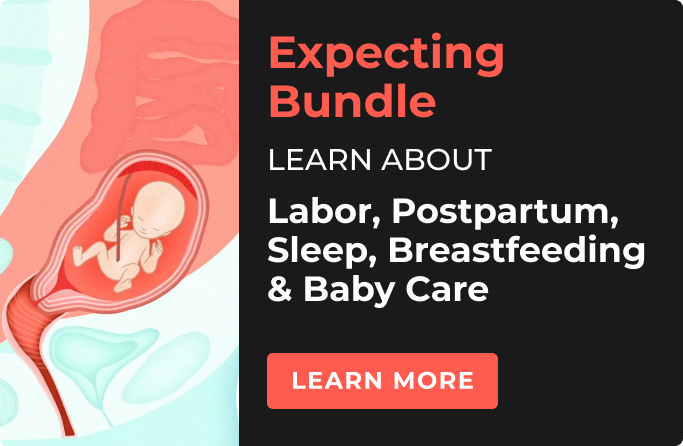If you’re pregnant, you’re probably wondering how COVID-19 impacts you and your baby. With so much information online, in the world, and in the media about COVID-19, it can be confusing and hard to trust a single “source of truth.” At Tinyhood, our goal is to provide you with current, factual information to help keep you safe and help you make the best decisions for you and your family.

How is COVID-19 transmitted?
The virus is thought to spread mainly from person-to-person through respiratory droplets produced when an infected person coughs, sneezes, or talks.
How can I best protect myself from COVID-19 while pregnant?
The best way to prevent illness is to avoid being exposed to this virus. Unfortunately, there is no way to ensure you have zero risk of infection, so it is important to understand the risks and know how to be as safe as possible.
In general, the more people you interact with, the more closely you interact with them, and the longer that interaction, the higher your risk of getting and spreading COVID-19.
To lower your risk of getting COVID-19, you and the people you live with can:
• Limit close contact interactions with other people as much as possible
• Wear a mask outside of your immediate household, especially when other social distancing measures are difficult to maintain
• Avoid others who are not wearing masks or ask others around you to wear a mask, if possible
• Stay at least 6 feet away from others outside your household
• Wash your hands with soap and water for at least 20 seconds. If soap and water are not available, use a hand sanitizer with at least 60% alcohol
• Avoid activities where taking protective measures may be difficult and where social distancing can’t be maintained
Do I have to be extra cautious about COVID-19 because I’m pregnant?
Based on what we know at this time, pregnant people might be at an increased risk for severe illness from COVID-19 compared to non-pregnant people. Additionally, pregnant people with COVID-19 may be at increased risk for other adverse outcomes, such as preterm birth.
If you’re pregnant...
Do your best to minimize your risk. Follow the CDC’s recommended preventive steps and encourage everyone in your household to follow them as well.
If eligible, be sure to talk to your healthcare provider about the benefits or risks of receiving COVID-19 vaccination while pregnant. Be sure to get the recommended vaccines during pregnancy that can help protect you and your baby. The CDC recommends all pregnant persons:
• Get vaccinated against influenza (or flu). Flu and COVID-19 are both respiratory illnesses that can spread from person to person. They can affect breathing and have similar symptoms, but they are caused by different viruses (read more about similarities and differences between flu and COVID-19). It is unknown how these two viruses may interact.
• Get the whooping cough (Tdap) vaccine during pregnancy to protect your baby against whooping cough, which can also present with similar symptoms to COVID-19.
Is it safe for a pregnant person or a newborn to go into a doctor’s office or hospital?
Yes, with a mask and proper safety precautions it is still important for you and your baby to go to your health care appointments. We urge you not to delay care or skip appointments. If you’re concerned about going to your appointments because of COVID-19, ask your healthcare provider what steps they are taking to separate healthy patients from those who may be sick.
If your prenatal classes on breastfeeding were canceled, you can check out Tinyhood's free breastfeeding offerings here.
What can I expect at the hospital during the COVID-19 pandemic?
Each country and/or state has different guidelines regarding protocols on the Labor and Delivery unit, Maternity unit, and the NICU. For example, many hospitals are limiting visitors to one or zero. Many hospitals are also testing all patients for COVID-19 as they are admitted, including pregnant people being admitted to Labor and Delivery.
If you are COVID-19 positive or suspected positive, the CDC recommends testing your newborn.
If you have any questions, ask your healthcare provider to walk you through the COVID-19 protocol during a prenatal appointment.
If I have COVID-19, can I give it to my baby?
Current evidence suggests that the risk of a newborn getting COVID-19 from its birth parent is low, especially when they use appropriate precautions before and during care of the newborn, such as wearing a mask and practicing hand hygiene.
If I have COVID-19, will baby and I be automatically separated?
The World Health Organization and CDC no longer recommend automatically separating baby from their birth parent due to a positive COVID-19 test. Note, however, that COVID-19 protocols may differ depending on country, state, city, and hospital. Furthermore, each situation will be determined on an individual basis depending on the circumstances.
It is helpful to think about what you prefer in this situation ahead of time. During a prenatal visit, discuss the risks and benefits of having your newborn stay in the same room as you at home. Having your newborn stay with you has the benefit of facilitating breastfeeding and maternal-newborn bonding, for example, while potential risks may include giving the virus to the newborn. Current evidence does suggest, however, that the risk of a newborn getting COVID-19 from their birth parent is low if precautions are taken.
If I have COVID-19, can I breastfeed?
The current recommendation is that if a breastfeeding or pumping parent is diagnosed with COVID-19, they can continue to breastfeed and/or express milk for baby. The WHO recommends that the benefits of breastfeeding substantially outweigh the potential risks for transmission.
Breast milk is the best source of nutrition for most infants. We do not know whether parents with COVID-19 can transmit the virus via breast milk, but the limited data available suggests this is not likely. Whether and how to start or continue breastfeeding should be determined by the parent in coordination with their family and healthcare providers.
If you are confirmed positive with COVID-19, it is important to take all possible precautions to avoid spreading the virus to your baby. This includes washing your hands before touching baby and wearing a face mask, if possible, while nursing. If you are pumping with either a manual or electric breast pump, ensure that you wash hands before touching any pump or bottle parts and follow recommendations for proper pump cleaning after each use. If possible, consider having someone else, who is not sick, feed the expressed breast milk to the baby.
Where can I get the latest information on COVID-19?
Information on COVID-19 is evolving daily and guidance from the CDC has changed and will likely continue to change. Always check the CDC and the WHO for the most recent guidance.

About our Expert
Dana Czuczka is a professionally trained IBCLC (International Board Certified Lactation Consultant), who has earned the highest credentials one can pursue in lactation consulting and works at a top-ranked hospital where she has helped thousands of families. She is ivy-league educated with a master’s degree in public health, is a mom of two kids (and two dogs), and enjoys tending to her vegetable garden.


